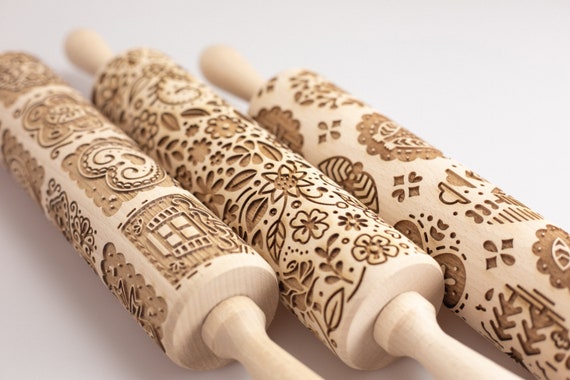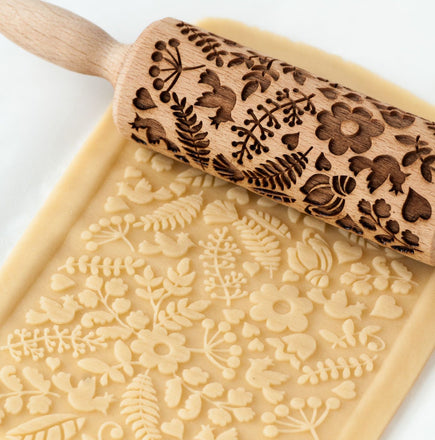Baking is not just a chore; it is an expression of love and creativity. One of the most delightful tools in a baker’s arsenal is the decorative rolling pin. With intricate designs and beautiful patterns, these rolling pins can transform ordinary dough into works of art. In this article, I’ll share my personal experiences and insights into decorative rolling pins while providing you with a thorough guide to help you choose the right one for your kitchen.
What Are Decorative Rolling Pins?
Decorative rolling pins are specially crafted kitchen tools used to roll out dough while imprinting decorative patterns onto the surface. They come in various materials, sizes, and designs, making them a versatile accessory for any baking enthusiast. These rolling pins can be used for cookie dough, pie crusts, fondant, and more, adding a touch of elegance and creativity to your baked goods.
Why Use Decorative Rolling Pins?
When I first discovered decorative rolling pins, I was immediately captivated. Not only do they enhance the aesthetic appeal of pastries, but they also streamline the decoration process. Here are some compelling reasons to incorporate them into your baking routine:
- Enhanced Presentation: They help create stunning designs that make your baked goods stand out.
- Ease of Use: Decorative rolling pins simplify the process of detailing dough, saving you time and effort.
- Versatility: Suitable for various dough types including cookies, pie crusts, and even pizza.
- Fun Activity: Using these pins can make baking a more enjoyable experience, especially for kids.
Types of Decorative Rolling Pins
There are several types of decorative rolling pins, each with unique features and benefits. Below are the most popular types:
1. Embossed Rolling Pins
Embossed rolling pins feature intricate designs carved into the surface. These patterns are transferred onto the dough, creating stunning visual effects. They are ideal for cookies, pastries, and fondant decorations.
2. Silicone Rolling Pins
Made from high-quality silicone, these rolling pins are non-stick and easy to clean. Some come with engraved designs that make them just as decorative as traditional wooden pins.
3. Personalized Rolling Pins
Personalized rolling pins can be customized with names, dates, or unique designs. They make excellent gifts for weddings, anniversaries, and housewarming parties.

4. Adjustable Rolling Pins
These rolling pins come with adjustable rings that help achieve the desired dough thickness. Some models feature decorative patterns which can be used for rolling out dough.
Comparing Decorative Rolling Pins: A Table
| Type | Material | Design Style | Cleaning | Best Use |
|---|---|---|---|---|
| Embossed Rolling Pins | Wood or Plastic | Intricate Patterns | Hand Wash | Cookies, Fondant |
| Silicone Rolling Pins | Silicone | Custom Prints | Dishwasher Safe | Various Doughs |
| Personalized Rolling Pins | Wood | Customizable | Hand Wash | Special Occasions |
| Adjustable Rolling Pins | Wood or Metal | Plain or Decorative | Hand Wash | Precision Rolling |

How to Choose the Right Decorative Rolling Pin
Selecting the right decorative rolling pin can greatly enhance your baking experience. Here are some factors to consider:
1. Material
The material of the rolling pin affects durability, ease of use, and maintenance. Wooden pins are traditional and sturdy, while silicone options offer flexibility and non-stick properties.

2. Design
Choose a design that resonates with your baking style. Whether you prefer floral patterns, geometric shapes, or personalized options, select a design that inspires you.
3. Size
Consider the size of the rolling pin according to your baking needs. A longer pin may be more suitable for larger baking projects, while a smaller one is easier to maneuver for detailed work.

4. Ease of Cleaning
Some rolling pins, especially silicone ones, are easier to clean than wooden models. Ensure you choose a material that fits your cleaning preferences.
Tips for Using Decorative Rolling Pins
Once you have selected the perfect decorative rolling pin, here are some tips to help you use it effectively:

1. Prepare Your Dough
Ensure your dough is well-chilled and not too sticky. A floured surface can help prevent sticking while using your rolling pin.
2. Roll Evenly
Use even pressure when rolling out the dough. Start from the center and work your way out to avoid uneven patterns.

3. Test the Design
Before rolling out your main batch, it might help to test the design on a small piece of dough to ensure you achieve the desired effect.
4. Clean Properly
Immediately clean your rolling pin after use to prevent any dough from drying on it. For wooden pins, a gentle wash with soap and water is sufficient.

Pros and Cons of Decorative Rolling Pins
Pros
- Adds beauty and creativity to baking.
- Easy to use and clean.
- Available in various designs and materials.
- A great gift option for baking enthusiasts.
Cons
- Can be more expensive than traditional rolling pins.
- Some designs may require more care to maintain.
- They may not be suitable for all types of dough, particularly very soft doughs.
Frequently Asked Questions (FAQs)
1. Can I use a decorative rolling pin for pizza dough?
Yes, decorative rolling pins can be used for pizza dough, but it’s advisable to avoid intricate patterns that might not hold up in the cooking process. Instead, opt for simpler designs that won’t interfere with pizza toppings.
2. How do I prevent dough from sticking to my rolling pin?
Dusting your rolling pin and the dough with flour can help prevent sticking. Alternatively, using parchment paper can also provide a non-stick surface.
3. How do I properly clean a wooden decorative rolling pin?
After each use, wipe the rolling pin with a damp cloth and mild soap. Avoid soaking it in water or placing it in the dishwasher, as this can damage the wood.
4. Are silicone rolling pins any good?
Silicone rolling pins are excellent options due to their non-stick properties, easy cleaning, and flexibility. They can be particularly useful for sticky doughs and are less prone to damage than wooden pins.
5. Where can I find custom engraved decorative rolling pins?
Custom engraved rolling pins can be found in specialty kitchen stores, craft fairs, or online marketplaces such as Etsy. Many artisans offer bespoke designs to fit your personal or gifting needs.
Conclusion
Decorative rolling pins are a fantastic addition to any kitchen. They not only make baking more enjoyable but also enhance the presentation of your culinary creations. Whether you’re a beginner or an experienced baker, using a decorative rolling pin allows you to express your creativity and delight your loved ones with beautifully crafted treats. I hope this guide has helped you understand the various types, uses, and tips for choosing the best decorative rolling pin for your baking adventures. Let’s roll out some dough and create delicious art!